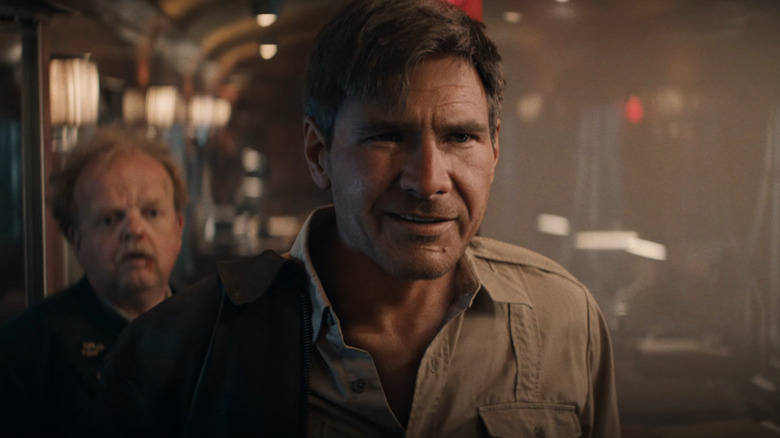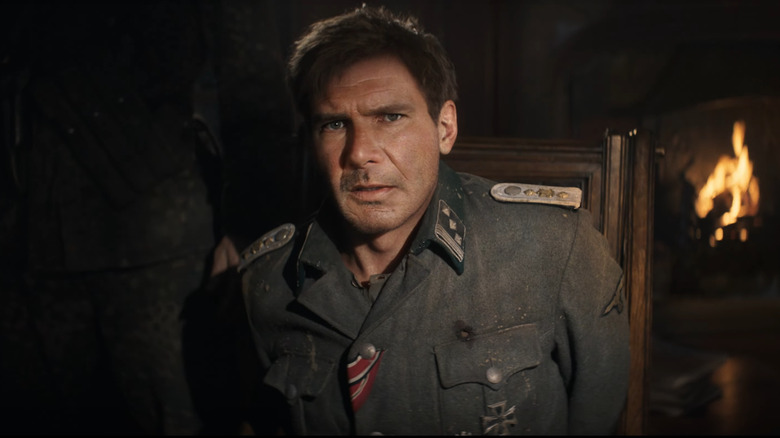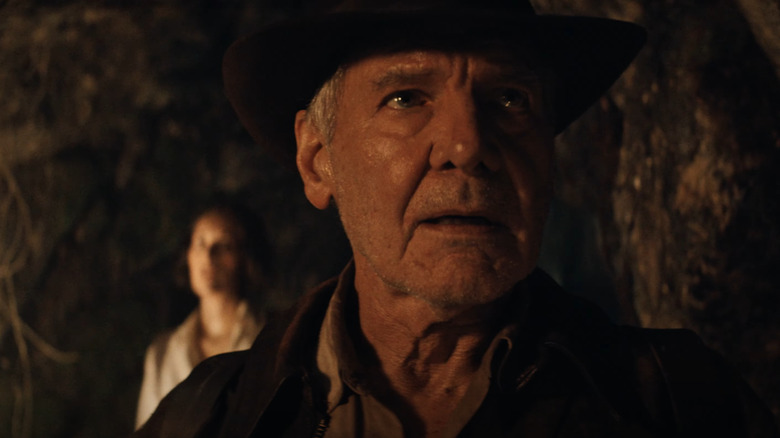Harrison Ford Still Sees 'That Guy With Brown Hair' When He Looks In The Mirror
De-aging tech has received its share of criticism, and rightly so. In our nostalgia-mad monoculture, being able to digitally rewind the physical effects of time seems like a neat trick that can, and kind of has, only been used as a gimmick. In recent years we've seen de-aging tech creep further into movie-making and so far it's yet to really prove its worth. There was the time Corridor Crew did a better job than Lucasfilm of deep-faking young Luke Skywalker. Then Martin Scorsese tried de-aging Al Pacino, Robert DeNiro, and Joe Pesci for "The Irishman" — a fascinating project that ultimately ended up feeling a bit uncanny, especially when DeNiro performed a fight scene as a 30-something version of himself who moved with all the aggression and vigor of a semi-conscious toddler waking up from a nap.
Other attempts at using de-aging tech as a storytelling device have come from Marvel, whose VFX department seemingly added one of those selfie beauty filters to Robert Downey Jr. for a brief flashback in "Captain America: Civil War." But for every ungodly android-esque nightmare vision, there are examples of the tech working quite well. That's especially true when it's used sparingly, like in the final act of "Blade Runner 2049" when Sean Young's Rachael is briefly resurrected as a clone.
And it seems, even though it's mostly set in 1969, the upcoming "Indiana Jones and the Dial of Destiny" is using young Indy flashbacks that, if the trailers are anything to go by, make similarly effective use of de-aging technology. This must have been a surreal experience for Harrison Ford, who evidently feels himself to still be the lovable young rogue that first won our hearts back in 1981's "Raiders of the Lost Ark."
Ford is young at heart
We've seen impressive de-aging shots in "Indiana Jones and the Dial of Destiny" thanks to the film's trailers, which showcase the 1944 flashbacks and the film's approximation of a young Indiana Jones. Harrison Ford, 80, is playing a 70-year-old version of Indy in the film's main 1969 setting. But it seems Lucasfilm has improved its de-aging tech drastically, which might have something to do with the fact they hired that YouTuber that did a better job than them of deepfaking back in 2021. The de-aged shots in "Dial of Destiny" are essentially advanced deepfakes, with Lucasfilm using their extensive archive of Ford's image to recreate his younger likeness.
Ford has spoken about how the de-aging shots in "Dial of Destiny" are different, in that they're all based on these historical images of his face which are superimposed onto his actual performance. Now, in a Total Film interview, the actor revealed that he finds the de-aging tech to be, "an intriguing, useful, and extremely sophisticated story device." That might have to do with the fact that, according to Ford, he still sees himself as a younger man. Asked whether he recognizes his older self in the de-aged shots, he said, "Yeah. In fact, when I look in the mirror, I still see that guy with brown hair."
Considering Harrison Ford hasn't shied away from doing his own stunts in "Dial of Destiny," while also throwing himself into some intense horse-riding action as part of his "1923" TV series, it's not all that surprising the 80-year-old still sees himself as a younger man. De-aging technology might have a surreal aspect to it, but it seems Ford found some kind of affirmation in seeing his performance as an octogenarian rendered in a younger-looking body.
Could Dial of Destiny be a turning point?
In the Total Film article, "Dial of Destiny" director James Mangold commented on Harrison Ford being an "incredibly gifted and agile" leading man. This bodes well, as while the de-aging certainly looks impressive thus far, its success will come down to whether Ford managed to sell his body movements enough to maintain the illusion while filming the scenes in question.
According to Mangold, those scenes comprise a, "25-minute opening extravaganza," designed to, "give the audience a full-bodied taste of what they missed so much" — that being young Indiana Jones. Until the film actually arrives we'll have to wait to see whether these VFX-assisted scenes actually do serve the story or whether they are, like so many other de-aging attempts, gimmicky nostalgia plays.
In general, de-aging tech is exciting in that it could allow older actors to demonstrate more of their abilities by playing younger versions of themselves and designing complex performances to meet that challenge. Think Matthew McConaughey in "True Detective" season 1. The Oscar winner played detective Rustin Cohle across a 17-year span, developing a detailed performance that made subtle changes to his character's body movements and vocal cadence depending on which version of Cohle he was portraying. Season 3 saw Mahershala Ali achieve a similar feat, but these were both younger actors playing older parts. If de-aging tech can reach a point where it's convincing enough to not disturb us all with nightmarish visions of half-human grotesques, then we could, theoretically be able to witness more of these types of singular performances from older actors. And perhaps "Dial of Destiny" will be the turning point.
"Indiana Jones and the Dial of Destiny" is due in theaters on June 30, 2023.


